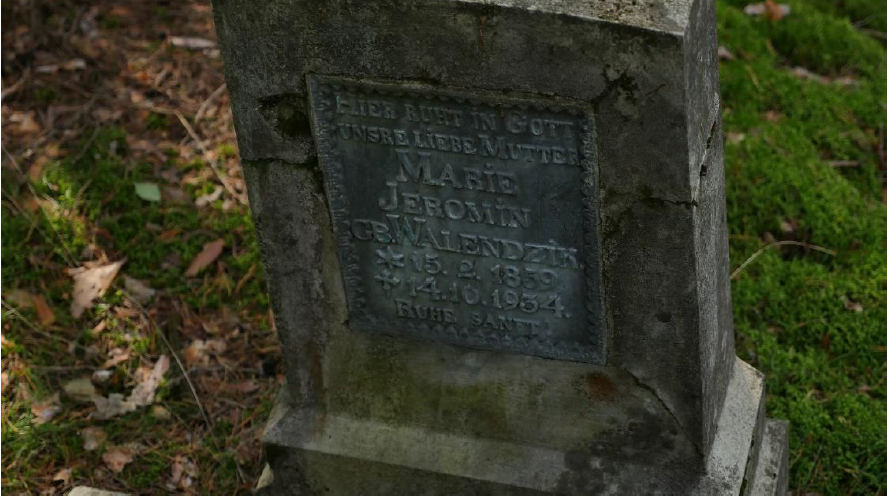Marie Walendzik was born in Klein Pasken on Feb. 15, 1859, the daughter of Ludwig and Julie Walendzik, née Konstanty. Her parents’ families – Walendzik and Konstanty – had both lived in Klein Pasken since at least the late 1800s, but were not among the village’s wealthy residents.[1] In addition to Marie, other siblings reached adulthood: her brother Gottlieb and sister Charlotte. A younger brother named Carl also received part of the inheritance, but his trail is lost before he became an adult.[2] It is possible that he left Pasken or died.
In her early 20s, Marie had an illegitimate son, Johann. Who Johann’s father was is not known.[3] In 1885, Marie’s parents went into retirement and divided their property between Gottlieb and Marie. Marie had to pay considerably more for the upkeep of her parents than her brother.[4] The reason for this was probably that Marie married Emil Jeromin, a wealthy farmer from Klein Pasken, shortly thereafter. He had previously loaned Marie money with which to buy her parents’ property.[5] The two probably married in 1886.[6]
Marie’s illegitimate son Johann died the following year at the age of only four.[7] Together with Emil, she had seven more children, but four of them died young.[8] At the birth of the last child – her daughter Martha – Marie Jeromin was already 46 years old.[9] Three of her children, sons Gustav and Gottlieb and daughter Frieda, survived childhood.[10] Marie’s mother Julie died in 1891,[11] and her father Ludwig in 1899.[12]
In 1912, the family built a new house. It had a tiled roof [13] and was no longer thatched as had been the custom in Masuria. The house had three rooms and a kitchen.[14] Nine years later Marie and Emil went to the retirement home. Their son Gustav took over the house and farm, and Gottlieb and Frieda, who was still a minor, each received a parental inheritance of 5000 marks.[15] Marie and Emil had a guarantee that they could stay in the house for the rest of their lives and that Gustav would provide them with free clothing, heating, light and medical treatment. In addition, they received an allowance of four marks per day per person, the right to eat at the family table free of charge, and a free funeral. In case the two wanted to run their own household, they would have continued to be supplied with food – including an iron cow.[16] If they had left the property, Gustav would not only have had to deliver the food within a radius of one kilometer, Marie and Emil would also have received compensation in the amount of 15,000 marks.[17]
Like many Masurians, Emil Jeromin had high hopes for the NSDAP.[18] He repeatedly petitioned the party in an attempt to recover his savings, which had been lost to inflation.[19] Marie and Emil both remained living in Gustav’s house until their deaths, although it became cramped there with the arrival of their daughter-in-law Anna and the births of five grandchildren by 1933, and three more by 1942.[20]
Marie Jeromin died on October 14, 1934, at the age of 75; Emil died five years later on December 16, 1939.[21] On Marie’s grave is one of the few surviving gravestones in Klein Pasken. The inscription is in German – although Marie had spoken only Masurian all her life.[22]
[1] For example Grundakten des Amtsgerichts Johannisburg, Archiwum Państwowe w Olsztynie (APO) 295/4341.
[2] APO 295/2782, Bl. 11f. und APO 295/2783, p. 6 – 8.
[3] Sterbeverzeichniss [sic], Standesamt zu Gehsen, APO 42/1745/1, <http://olsztyn.ap.gov.pl/baza/skany.php?z=1745&s=1> (zuletzt aufgerufen am 27.02.2021), sheets 120f.
[4] APO 295/2782, sheets 12f. und APO 295/2783, sheets 6 – 8.
[5] APO 295/2782, sheets 15.
[6] Cf. ibid., sheet 27. In 1906, Emil Jeromin registered himself as co-owner of the property Klein Pasken 8 and declared that he had been married to Marie Walendzik for 20 years. Cf. also APO 42/1745/1, sheet 120, in 1887 Marie was already married to Emil when she took over her parents’ property at the end of 1885, but not yet.
[7] APO 42/1745/1, sheet 120f.
[8] Daughter Auguste Jeromin died on 26.02.1893 at the age of 1 year and 10 months, cf. ibid., sheet 202f. Son Friedrich Jeromin died on 26.11.1897 at the age of one and a half years, cf. ibid., sheets 256f. Only nine days later their son Carl Jeromin also died at the age of 4, cf. ibid., sheet 256f. Martha Jeromin was the last child of the two, she died on 04.01.1906 at the age of three and a half months. Cf. ibid., sheets 324f.
[9] Ibid, sheets 324f.
[10] APO 295/2782, sheets 34f.
[11] Ibid., sheet 24.
[12] Ibid., sheet 25.
[13] Lastenausgleichsakten Gustav Jeromin, Bundesarchiv Lastenausgleichsarchiv (BA LAA), ZLA 1/5699335.
[14] Ibid.
[15] Ibid APO 295/2782, sheets 34f.
[16] An iron cow or other iron cattle were animals that were always present and had to be replaced in case of death. Gustav thus promised to always provide his parents with a cow for the rest of their lives. Cf. German Legal Dictionary Online, entry Eisenkuh and the related entries: <https://drw-www.adw.uni-heidelberg.de/drw-cgi/zeige?index=lemmata&term=eisenkuh#Eisenkuh> (last accessed 07/10/2021). Iron animals were not infrequently part of the dowry for old people’s sharecroppers, cf. for example entry Wilken, grave no. 22, Auguste and Gottlieb Gratzik and Karl Brunner: Ostdeutsche Volkskunde, Leipzig 1925, p. 36.
[17] If the plot had been sold, the two would also have received compensation, cf. APO 295/2782, sheets 34f.
[18] Andreas Kossert: Masuren. Ostpreußens vergessener Süden, 5th edition, München 2006, p. 299, p. 301 – 303.
[19] APO 295/2782, sheets 45.
[20] Residents list for Pasken, BA LAA OSTDOK 3, Nr. 150, sheet 10.
[21] APO 295/2782, sheet 42 und APO 42/1745/1, sheet 532f.
[22] For example APO 295/2782, sheet 11f., sheet 34.
